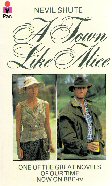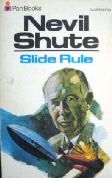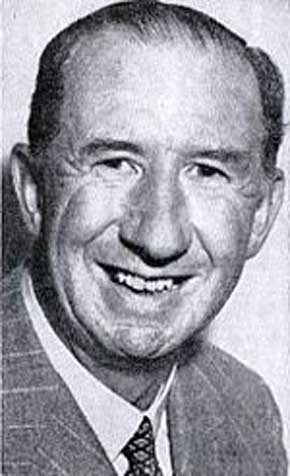 Snippets from my summer reading of Parallel Motion, a new biography of novelist Nevil Shute, author of A Town Like Alice, Trustee from the Toolroom, No Highway and many more novels showing the best of the human spirit.
Snippets from my summer reading of Parallel Motion, a new biography of novelist Nevil Shute, author of A Town Like Alice, Trustee from the Toolroom, No Highway and many more novels showing the best of the human spirit.
“Shute summed up the carefree days of peace before the First Wold War with the poem Romance by Eleanor Geach… [but for the schoolboy] Shute, as for millions of others, the attitude to the War [and to life] changed as the casualties increased… His thoughts were no longer of a career on leaving school. As he later wrote, he was ‘born to one end’: to go into the army and do his best before he too was killed… The school casualties mounted almost daily with the names of older boys, whom he had known, being read out in Chapel, and realising that younger boys might one day be kneeling in remembrance of him.”
 “For Shute, as for the country as whole, the war had been a costly and devastating experience. His beloved brother and many of his friends from school had been killed. Indeed, some 320 [schoolmates] were killed during the First World War. Shute had mentally prepared himself for the same fate but he had been spared; he was one of the reprieved. He had a future and began to realise there was such a thing to be got out of life as fun.”
“For Shute, as for the country as whole, the war had been a costly and devastating experience. His beloved brother and many of his friends from school had been killed. Indeed, some 320 [schoolmates] were killed during the First World War. Shute had mentally prepared himself for the same fate but he had been spared; he was one of the reprieved. He had a future and began to realise there was such a thing to be got out of life as fun.”
In early 1936, his aircraft design and manufacturing company Airspeed designed their new Envoy plane around the new modern Wolseley radial engine.
“So it came as a real blow when [Wolseley’s] Lord Nuffield announced in 1936 that they would cease making the engine, which had been developed at a cost of £200,000. Nuffield’s decision arose from the system adopted by the Air Ministry. The ordering procedure used I.T.P (Instruction to Proceed) contract terms. This [heavily bureaucratic[ system specified a maximum fixed price which could, after investigation, be less. Lord Nuffield got the I.T.P. contract documents for the Wolseley radial engine and realised the implications. The terms would have required re-orientation of their offices with an army of accountants to keep track of production costs… So the aero engine project was abandoned, much to Shute’s dismay. He regarded it as a major disaster for Airspeed, and decided that he must make an effort to see if Nuffield could be persuade to change h is mind… Lord Nuffield received him courteously. This was the same William Morris whom Shute, as a schoolboy, had watched building his cars in Longwall St, Oxford. Recently ennobled, he was the head of a large manufacturing business that included Wolseley. He listened carefully to what Shute had in mind and was sympathetic, but reminded Shute that he had the Air Ministry to thank for his decision to stop manufacture of the aero engines. He was angry with the Ministry and told Shute he had ‘sent that I.T.P. thing back to them and told them they could put it where the monkey puts his nuts.’
is mind… Lord Nuffield received him courteously. This was the same William Morris whom Shute, as a schoolboy, had watched building his cars in Longwall St, Oxford. Recently ennobled, he was the head of a large manufacturing business that included Wolseley. He listened carefully to what Shute had in mind and was sympathetic, but reminded Shute that he had the Air Ministry to thank for his decision to stop manufacture of the aero engines. He was angry with the Ministry and told Shute he had ‘sent that I.T.P. thing back to them and told them they could put it where the monkey puts his nuts.’
… The Wolseley episode left a sour taste in Shute’s mouth… To his mind civil servants, with their restrictive practices and small-minded attitude, had deprived the country [at at time of impending war] of an excellent aero engine.”
 1949 saw Shute piloting a tw0-seater Percival Proctor nicknamed ‘Item Willie” on the then difficult journey from London to Australia, stopping only for fuel and servicing along the way.
1949 saw Shute piloting a tw0-seater Percival Proctor nicknamed ‘Item Willie” on the then difficult journey from London to Australia, stopping only for fuel and servicing along the way.  “[From the airfield] they took the bus into Athens so they could visit the Acropolis. [His passenger] thought the Parthenon was one of the most beautiful buildings he had ever seen. Shute said he preferred the Rockefeller Plaza, holding that it was a complete work of art, whereas the Parthenon was handicapped by being a ruin.”
“[From the airfield] they took the bus into Athens so they could visit the Acropolis. [His passenger] thought the Parthenon was one of the most beautiful buildings he had ever seen. Shute said he preferred the Rockefeller Plaza, holding that it was a complete work of art, whereas the Parthenon was handicapped by being a ruin.”
61 days after leaving England, they cleared customs in Darwin. After enjoying Australia climate, hospitality and friendliness for a month he landed in Sydney, at Bankstown .
“There he ran into trouble, not a good introduction to Sydney. He was told he should have flown to Mascot. He phoned the controller and said that Bankstown was his destination, that he had made forty landings in Australia and Bankstown was the forty-first: He would take the documents to the Custom House or they could come and get them, whichever they preferred. He then rang off and went to lunch.
“On his return, there was a message saying that unless he flew to Mascot immediately, police action would be taken… Customs [there] insisted on opening all his luggage and searching it—God knew what for, since he had been in Australia for a month… There he arranged with de Havilland for a programme of work to be carried out on Item Willie he thought would take rather more than a week… He would therefore have to stay in this unpleasant place for 10 days or so. He wished to God he had never come south in this country, but passports, visas and aircraft permits to fly home could not be secured except in Sydney or Melbourne. Sydney seemed to him to be an ugly, cheap city full of drunks.”
 His impressions of Melbourne were vastly different, and he was to settle there the next year, just after the publication of A Town Like Alice.
His impressions of Melbourne were vastly different, and he was to settle there the next year, just after the publication of A Town Like Alice.
“In mid-June 1950 Shute wrote to [long-time friend and adventurer Sir Alan] Cobham … saying he was packing up in England and going to live in Australia… His decision to leave England was prompted by several factors, not least of which was a major public row over his petrol ration. In Britain in 1950 petrol rationing was still strictly enforced [by the Attlee Labour Government], five years after the end of the War. [Shute engaged in lengthy but essentially futile correspondence with “The Ministry” proposing an alteration in his “allocation” so he might travel for research, saying after sending one letter] he would watch for their reaction to his proposal with interest since the ability of the Government to conduct itself with good sense in such matters would seriously affect the decision he took whether to stay in England or go… Nearly a fortnight went by without a reply from the Ministry, which caused Shute to send a letter rebuking them for the delay which in business circles would be “regarded as an act of studied insolence.” … By the time he won [his third victory in eighteen months] he had made up his mind to leave England… The row over petrol rationing, like the demise of the airship programme [which had been another lesson in militant bureaucracy], marked a turning point in Shute’s life…
“Bureaucracy, always Shute’s bête noir, had raised its obstructionist head and inflamed his anger, vented in his letters to the Ministry… He did not leave for the United States, as he told the Ministry, but Australia… He had been impressed with Australia during his visit there, more so with Melbourne than Sydney. In his letter to the Society [of Authors] he said he reckoned he could get three good books out of there which would probably take him five years to research and write, and five years was as far as anybody could see in those times.”
“When Shute arrived in Melbourne there was quite a crowd of reporters at the foot of the gangway waiting to question him. They wanted to know if it were true that he had ducked out of England to avoid high taxes. Shute replied that the taxes in England were unpleasant and so was the current government’s experiment in socialism. He added that he had also decided to come to Australia because everything about the country fascinated him—even the climate.”
“[In his autobiography, Slide Rule, Shute] dealt at length with the [1920s] airship programme and the rivalry between the [private] R.100 and [the government] R.101, and placed the blame for the R.101 disaster squarely on the civil servants and [Air Minister] Lord Thomson in particular. Reflecting his experiences at that time and also probably his treatment at the hands of the Ministry of Fuel and Power, he wrote that ‘a civil servant or politician is still to me an arrogant fool until he is proved otherwise.’ … Shute felt that a study of the accident could ‘provide data to rectify many of the ills that plague our democracy today.’”
 “On the Beach was to feature a motor race towards the end and, early in 1956, Shute ordered a Jaguar XK140 sports car. This was so that, he claimed, he could obtain first-hand experience of racing a high performance car… As he wrote in Slide Rule, ‘it is very good for the character to engage in sports which put your life in danger from time to time. It breeds a saneness in dealing with day-to-day trivialities which cannot be got in any other way, and a habit of quick decisions.”
“On the Beach was to feature a motor race towards the end and, early in 1956, Shute ordered a Jaguar XK140 sports car. This was so that, he claimed, he could obtain first-hand experience of racing a high performance car… As he wrote in Slide Rule, ‘it is very good for the character to engage in sports which put your life in danger from time to time. It breeds a saneness in dealing with day-to-day trivialities which cannot be got in any other way, and a habit of quick decisions.”
“From his earliest days in Australia, Shute had taken an interest in the fortunes of young Australian writers… He was on friendly terms with Robert Menzies, the Prime Minister, and also with Richard (Dick) Casey, then Minister of External Affairs… and sent off for publication … a memorandum he wrote to Menzies. The purpose of the memorandum was to set out his thoughts, not only on creative writers, but also on artists and composers in Australia…
“It was the purpose of the memorandum to show how Australian prowess in in the creative arts of peace might be nurtured and displayed to the world…
“At the outset he said he did not believe it was wise to assist writers with any form of subsidy so they could write a book. He reiterated what he said before—that is was best for the young man or woman who wanted to write to take a job in a commercial occupation and write in the evenings until the writing became more profitable. That way the writer would get to know the characters of men and women during his or her formative years. They were the raw material of stories…
“A certain degree of success was of course necessary or the young writer would stop writing, But too much encouragement from literary authorities, without corresponding support from the public, might induce in the writer an illusion that he was a superior person to the common man and a belief that, if they public would not read the pearls of wisdom he laid before them, they should be made to do so in their own interest.  “Shute wrote [however] that subsidies from the [Commonwealth Literary] Fund should continue. Such magazines gave useful encouragement to writers.”
“Shute wrote [however] that subsidies from the [Commonwealth Literary] Fund should continue. Such magazines gave useful encouragement to writers.”
“In conclusion, Shute wrote that a person who was gifted with creative powers could usually exercise those powers in many fields of the world’s creative activities. In his early years, his work on new aircraft designs was very satisfying to the creative side of his character and those years were followed by creating a new aircraft company and working it up from zero until it employed a thousand men in time of peace. He went on to say that, compared to creative work of that magnitude, the writing of fiction stories seemed to him at the time to be ‘a pansy occupation’ and still did. If the aircraft industry had continued as it was when he was a young man, when aircraft could fly within six months of first conception, then he might still be an engineer.”
4 comments:
Love this stuff. Keep em coming. Cheers Suzuki
Sounds good to me...
Yup, keep 'em coming. I'm getting me a copy of this.
Thank you very much. I agree with your article, this really helped me. I appreciate your help. Thanks a lot. Good website.
Auto Electrical Services Bankstown
Post a Comment